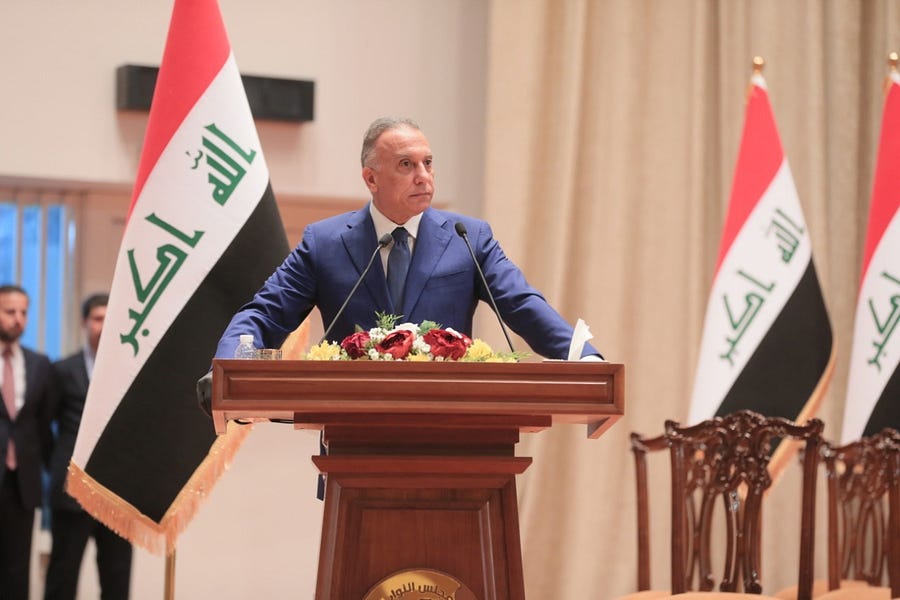In recent days, Secretary of State Mike Pompeo warned Iraqi Prime Minister Mustafa al-Kadhimi that the U.S. will close its embassy and withdraw diplomats if Baghdad fails to stop rocket attacks by pro-Iran Shiite militias against U.S. interests, creating an unnecessary rift in relations between the two allies. As recently as August, Kadhimi’s visit to the U.S. had been hyped as a new chapter in this relationship.
Holding those responsible for violence against protesters and bringing all arms under government control were among Kadhimi’s stated priorities when he took office in May. But today he faces an aggravated set of challenges. Falling oil prices and rising COVID rates have produced an economic crisis that is compounding the state’s inability to deliver basic services. Unemployment, corruption, and poor public services have led to nationwide protests in the year since the fall of Adel Abdel Mahdi’s government.
Like every Iraqi prime minister before him, Kadhimi is performing a balancing act between two foreign backers, the U.S. and Iran, who are pressuring him while themselves engaged in shadow warfare. Back in May, Kadhimi famously told the U.S. that “Iraq will not be a ground for settling accounts.” Iranian Supreme Leader Ali Khamenei conditioned Iran’s support on leaving the pro-Iranian militias alone. Meanwhile, the barrage of Iranian-fueled attacks to force a U.S. withdrawal have intensified since the U.S. drone strike in January that killed Abu Mahdi al-Muhandis, the head of the pro-Iran Kataib Hezbollah militia that is part of the Popular Mobilization Forces (PMF), and Iranian military leader Qassem Suleimani in December 2019. The U.S. has, in turn, imposed secondary sanctions on political figures and organizations closely tied to Iran and pushed the government to stop importing natural gas and oil from Iran, hoping to isolate Iran further economically.
Kadhimi, however, has never stopped applying pressure on the militias, gradually purging them from state institutions to bolster these and weaken the militias. But when he has acted aggressively, it has backfired, revealing his limited room for maneuver. When he ordered a raid on a Kataib Hezbollah facility that led to the arrest of 14 members suspected of involvement in U.S. attacks, militia members marched into the Green Zone threatening to retaliate.
When undertaken less conspicuously, the strategy has been effective. Early on, Kadhimi moved to establish state control of borders, which are mostly run by armed groups. Iraq imports almost all its goods from Iran or Turkey, but customs officials charge little duty in exchange for bribes leading to an estimated annual loss of $3 billion to $4 billion. Not only will border control increase government revenues to make up for falling oil prices, but it will cut off important revenue streams from the PMFs who control many of these crossings. Initial reports suggest his July takeover of Basra’s ports and land border crossings could yield $400 million in customs revenues. And the prime minister’s doubling down on his commitment to protect activists even as these continue to be assassinated and injured is also a snub to Iran-aligned factions who are behind the attacks.
We shouldn’t forget that Kadhimi was the compromise choice for prime minister after two predecessors proved unable to form a government. Relatively unknown on the Iraqi political scene, he has no political party, no majority in Parliament, and his potential constituency is divided, unorganized, and unlikely to win elections. Indeed, he has openly rebuked the political establishment, leaving him with few allies. And so he does not have the domestic political support that will enable him to tip the balance in his favor; he is not really in a position to take on the militias.
Moreover, the Iran-backed militias are not just loose elements that can be reined in; they consist of hybrid paramilitary/political actors beholden to Iran who are enmeshed in state institutions and leveraging state resources to sustain supporters and interests. Trying to remove them may undermine the very institutions they captured. Their increasing mafia-like actions, such as the operation of checkpoints in areas they control—levying tolls, demanding protection money, and kidnapping people for ransom—have also turned them into an economic (albeit illegal) power.
Kadhimi, despite having antagonized the pro-Iranian camp, is in the unenviable position of having neither political capital nor patronage. If he goes aggressively against his rivals, it will backfire; the assassination of prominent security expert Hisham al-Hashimi was enough of a warning shot. But Kadhimi is pragmatic and realistic. He will use this time in office to quietly expand his influence and inner circle, to build an electoral coalition, and cement his position of power, and in the process he will slowly but surely reduce the influence of the Iranian-backed militias and eventually get rid of them. The U.S. should, until then, help lay the grounds for his success.
Patricia Karam is the regional director for the Middle East and North Africa at the International Republican Institute.
Photograph by Iraqi Parliament/Handout/Anadolu Agency/Getty Images.








Please note that we at The Dispatch hold ourselves, our work, and our commenters to a higher standard than other places on the internet. We welcome comments that foster genuine debate or discussion—including comments critical of us or our work—but responses that include ad hominem attacks on fellow Dispatch members or are intended to stoke fear and anger may be moderated.
You are currently using a limited time guest pass and do not have access to commenting. Consider subscribing to join the conversation.
With your membership, you only have the ability to comment on The Morning Dispatch articles. Consider upgrading to join the conversation everywhere.